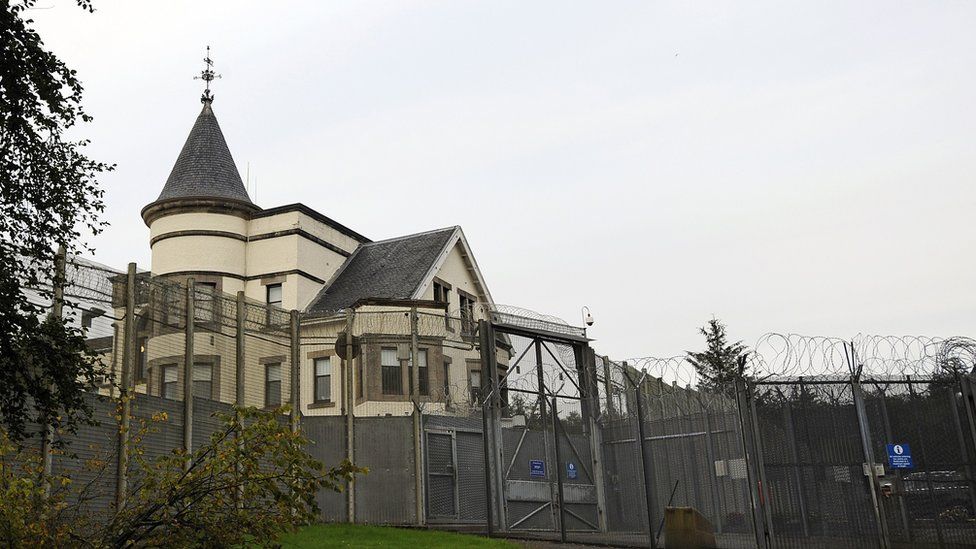'At risk' adults held at Dungavel immigration centre
- Published

Almost 40% of people detained in Scotland's only immigration removal centre are classed as vulnerable, figures obtained by BBC Scotland show.
Dungavel in South Lanarkshire holds asylum seekers and illegal immigrants who are awaiting deportation after their bid to stay in the UK has failed.
Home Office guidance states there is "a clear presumption" that detention is not appropriate for vulnerable people.
A spokeswoman said detention was used sparingly and only when necessary.
Campaigners, however, insist the "adults at risk" policy is not fit for purpose, and should be reviewed.
Dungavel opened as an immigrant detention centre in 2001 and is run on behalf of the Home Office by a private company.
Like other centres around the UK it has been criticised by campaigners, with the detainees claiming they are treated like prisoners.
There is also concern about the length of time people can be detained at the centre.
'I wasn't medically fit to stay in prison'
'I asked for protection but was put in prison'
Zacharie Cyriaque Ayard-Nzapajima came to the UK in 2012. He claims he was tortured in the Central African Republic after a protest about military jobs.
In January 2019 he was held in Dungavel despite being classed as vulnerable.
Under Section 35 of the 2001 Detention Centre Rules, a report must be prepared on any person whose mental or physical health is likely to worsen as a result of being held in detention.
The BBC has seen a medical report stating that Zacharie may have been a victim of torture.
He told the BBC he was taken for medical tests the day after he was detained.
Zacharie said: "They examined me - I've got the documents there - and they said I wasn't medically fit to stay in prison but they kept me there for three weeks.
"Can you believe that? They kept me for another three weeks. Here, speaking to you now, I'm not someone like you. I've lost a lot of my faculties. They traumatised me."
The BBC was not able to verify everything Zacharie told us about his life in the Central African Republic but we did see evidence that appeared to support claims he was in danger.
He feels let down by the UK.
He said: "I'm not a criminal. I respect the law. I need protection in this country and they treat me like that. Why? Is that right?"
Zacharie was eventually released from Dungavel and is now awaiting the outcome of a judicial review in relation to his case.
Vulnerable people detained
Concerns about the detention of vulnerable asylum seekers were raised by Her Majesty's Inspectorate of Prisons in 2015 and a report by inspector Stephen Shaw led to plans for a change of approach.
It says: "The clear presumption is that detention will not be appropriate if a person is considered to be at risk. However…it will remain appropriate to detain individuals at risk if it is necessary in order to remove them."
People who have been tortured or trafficked are among those classed as vulnerable.
BBC Scotland asked the Home Office how many people were being held in Dungavel and how many were classed as adults at risk.
The Home Office data from 31 December 2018 shows that 61 people were detained and of those 24, or 39%, were adults at risk.
Several charities working with asylum seekers said the "adults at risk" policy was not working.
Fiona Crombie, from Freedom from Torture in Glasgow, told BBC Scotland the policy "needs to be fit for purpose".
Ms Crombie said there needed to better definitions of what constituted a "vulnerable" adult and these people should be assessed quickly and flagged as "at risk".
She said: "It is very difficult because their mental health is very fragile.
"The majority of the people we work with have experienced physical as well as emotional torture. Being treated in a way that is often punitive and adverse reminds them of those experiences.
"They have flashbacks, nightmares and intrusive memories and it is difficult for them to be able to manage those symptoms."
'Hugely traumatic'
Ms Crombie added: "The experience of detention is a huge setback for most of these individuals.
"The experience of being locked up with bars and huge gates in the middle of nowhere where it's very difficult for anyone to access is hugely traumatic."
Immigration is reserved to Westminster. The BBC requested to speak to a Home Office minister about the adults at risk policy but was told no-one was available.
A spokeswoman said: "The health, welfare and dignity of those in immigration detention is of the utmost importance.
"We use detention sparingly and only when necessary and vulnerable people are detained, or their detention continued, only when the immigration considerations outweigh the evidence of vulnerability.
"We have made significant improvements in recent years, but following Stephen Shaw's second review the Home Secretary made clear that we our committed to going further and faster in exploring alternatives to detention, increasing transparency around it and improving the support available for vulnerable detainees."
- Published3 February 2017
- Published8 September 2016
- Published4 March 2015